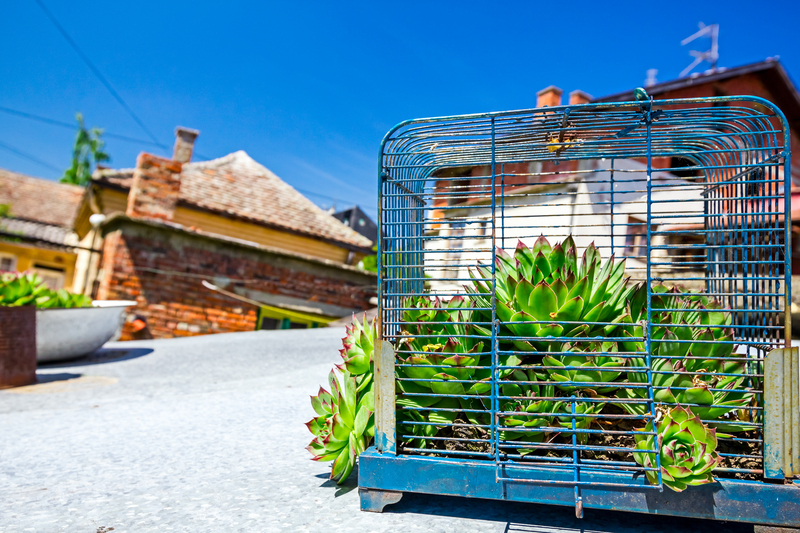Eco-Friendly Solutions: Organic Waste to Soil
Posted on 24/09/2025
Eco-Friendly Solutions: Organic Waste to Soil
In an era where environmental responsibility is more critical than ever, finding innovative and sustainable ways to handle organic waste is a global priority. Eco-friendly solutions that turn organic waste into rich, nourishing soil offer both environmental and economic benefits. This comprehensive guide explores how converting organic waste to soil can revolutionize sustainability efforts, reduce landfill use, lower carbon emissions, and foster a healthier planet.

Understanding Organic Waste and Its Impact
Organic waste encompasses a broad range of biodegradable materials, from food scraps and yard trimmings to paper products and agricultural by-products. When improperly disposed of, these waste materials contribute to a host of environmental problems, including the production of harmful methane gas in landfills. Transforming organic waste into soil through natural cycles and composting not only reduces landfill burdens but also improves soil fertility and promotes regenerative agriculture.
Types of Organic Waste
- Food Waste: Fruit and vegetable peels, coffee grounds, eggshells, and leftovers
- Yard Waste: Grass clippings, leaves, branches, garden trimmings
- Paper and Cardboard: Uncoated, non-glossy paper and cardboard products
- Agricultural By-products: Crop residues, livestock manure, and other farm wastes
Benefits of Converting Organic Waste to Soil
1. Reducing Landfill Volumes
When organic matter is sent to landfill, it decomposes anaerobically and releases methane--a potent greenhouse gas. By turning organic waste into soil, we can prevent tons of biodegradable material from clogging landfills and simultaneously minimize methane emissions.
2. Improving Soil Health
Compost and other forms of recycled organic waste greatly enrich soil health. They introduce essential nutrients, enhance soil structure, and improve moisture retention, crucial for sustainable agriculture and landscaping.
- Increases nutrient content and promotes healthy plant growth
- Encourages beneficial microbial activity
- Enhances soil's water-holding capacity
3. Climate Change Mitigation
A key eco-friendly solution to global warming, converting organic waste to soil cuts down on landfill methane production and helps soils capture more carbon, thus serving as a vital carbon sink.
4. Economic Savings and Job Creation
Communities and businesses implementing organic waste-to-soil programs often see reduced waste disposal costs and new employment opportunities in composting facilities and green technology startups.
5. Circular Economy Advancement
Organic waste conversion is a pillar of the circular economy. Instead of a linear system (produce, use, discard), organic materials are cycled back into the ecosystem, supporting sustainable food systems and reducing dependency on synthetic fertilizers.
Eco-Friendly Methods for Turning Organic Waste into Soil
1. Composting
Composting is the most widely practiced eco-friendly method for converting organic waste into fertile soil. Through aerobic decomposition, microorganisms break down biodegradable material into humus--an essential soil amendment.
- Backyard Composting: Ideal for households with gardens, using simple bins or piles
- Vermicomposting: Involves worms that accelerate decomposition and produce nutrient-rich worm castings
- Industrial Composting: Large-scale operations that process food, yard, and even some biodegradable packaging waste
Benefits of Composting:
- Reduces household and municipal waste output
- Produces high-quality, organic fertilizer for gardens and farms
- Lowers the need for chemical soil amendments
2. Anaerobic Digestion
Unlike composting, which uses oxygen, anaerobic digestion breaks down organic waste in oxygen-free environments, producing both biogas and a nutrient-rich digestate that can be used as soil conditioner.
- Biogas Generation: Produces renewable energy along with soil products
- Suitable for: Food waste, manure, and other high-moisture organic inputs
3. Bokashi Fermentation
Bokashi is a Japanese technique using specific microorganisms to ferment organic waste. The pre-composted material can then be buried in soil, where it continues to break down and nourish plants.
- Compact and odorless, perfect for urban and apartment dwellers
- Handles a wider range of organic waste (including meat and dairy)
4. Black Soldier Fly Larvae (BSFL) Processing
An innovative method, black soldier fly larvae consume organic waste rapidly and produce both a high-protein feed (larvae) and a nutrient-dense residue used as soil amendment.
How to Start Composting at Home
Choosing the Right Composting System
Select a method that fits your space, lifestyle, and the amount/types of organic waste you generate. Popular options include outdoor bins, tumblers, worm bins (vermicomposting), or Bokashi buckets for indoor use.
Building the Perfect Compost Pile
- Browns: Dry leaves, cardboard, straw (provide carbon)
- Greens: Food scraps, grass clippings (supply nitrogen)
- Air & Moisture: Turn regularly and keep slightly damp
Tip: Avoid adding meat, dairy, cooked foods, or oily products to traditional compost bins to prevent odors and pests (except with Bokashi or advanced systems).
Maintaining Healthy Compost
- Monitor moisture levels: keeps decomposition active without being soggy
- Turn or mix the pile regularly to introduce oxygen
- Harvest finished compost every few months: look for dark, crumbly, earthy-smelling material
Community and Citywide Organic Waste-to-Soil Programs
While individual efforts are impactful, large-scale transformation requires municipal and community action. Many cities now offer curbside organic waste collection, industrial composting, and commercial food scrap recycling programs.
- San Francisco: Diverts over 80% of waste from landfill via mandatory composting
- Toronto: The Green Bin Program collects organic waste from millions of residents weekly
- France: National ban on supermarket food waste, fostering community composting initiatives
Participating in such programs can multiply the impact of eco-friendly solutions, creating more fertile soil for parks, community gardens, and even local farms.
Innovations in Organic Waste Conversion Technologies
Smart Composters
IoT-enabled compost bins now optimize conditions automatically using sensors for temperature, moisture, and aeration, making home composting more accessible than ever.
Advanced Bioreactors
Bioreactors efficiently handle massive quantities of organic waste with minimal odor and rapid output. Some even capture greenhouse gases for use as fuel.
Soil Remediation and Biochar
Innovative pyrolysis processes convert organic matter not just into compost, but into biochar--a stable form of carbon that improves soil health and locks away atmospheric CO2 for centuries.
Barriers and Solutions in Organic Waste to Soil Transition
Despite the clear benefits, several challenges can impede the transition, especially in densely populated urban areas.
Barriers
- Lack of public awareness or motivation
- Insufficient infrastructure or collection systems
- Contamination from non-compostable waste
- Regulatory or zoning hurdles for community sites
Solutions
- Education: Workshops, school programs, and public campaigns
- Policy Support: Incentives, grants, or mandates for organics diversion
- Technological Innovation: User-friendly systems and better waste sorting
- Community Engagement: Local collectives, garden initiatives, and social enterprises
How Businesses Can Adopt Organic Waste to Soil Practices
On-site Composting Programs
Restaurants, hotels, corporate campuses, and supermarkets can implement on-site composting systems, reducing waste disposal fees and enhancing green credentials.
Partnering with Local Farmers or Composters
Businesses can divert their organic waste streams to local agricultural operations or commercial composting sites, supporting the local economy and sustainable agriculture.
Green Certifications
Companies embracing eco-friendly methods of organic waste recycling may qualify for green certifications--valuable in attracting environmentally-oriented customers.
Organic Waste to Soil in Sustainable Agriculture
Farms converting crop and animal waste into compost reduce reliance on synthetic fertilizers, build vibrant soil, increase biodiversity, and often yield healthier, tastier crops. This fosters regenerative agriculture--a practice that heals the land while producing food.

How Individuals Can Support Organic Waste Recycling
Simple Everyday Actions:
- Separate organic waste at home and work
- Start a home compost or join a community compost program
- Educate others about the impact of organic waste conversion
- Shop from businesses and farmers that prioritize composted soil
Conclusion: Enriching the Earth with Eco-Friendly Solutions
Turning organic waste into fertile soil is more than a waste management strategy--it's a cornerstone of sustainable living and a healthier ecosystem. By adopting these eco-friendly practices at all levels--from our kitchens to our cities--we can regenerate the earth, cut greenhouse gases, and sustain future generations. Whether you are a homeowner, business, policy maker, or farmer, choosing to divert organic waste to soil is a practical step with profound environmental rewards.
Let's join hands to close the loop, support soil health, and champion eco-friendly solutions in every community. The future of our planet starts with what we do with our waste today.
Latest Posts
Eco-Friendly Solutions: Organic Waste to Soil
Elevate Your Landscape with Artistic Hedge Trimming
5 Practical Ways to Achieve a Budget-Friendly, Low Maintenance Garden
Find Tranquility in Your Garden with Zen-inspired Ideas
Flourish with Ease: 9 Fundamental Gardening Tips for Starters



